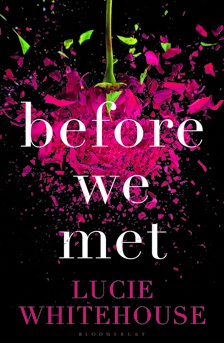Harness the magic
by Lucie WhitehouseLucie Whitehouse’s latest novel Before We Met is a suspenseful story with a chilling climax about a whirlwind romance that unravels and sours as information seeps from a hidden past. Here are her ten rules for keeping the creative juices flowing.
1. Observe
Train yourself really to see things. A good way to do this is to pick an object at random once or twice a day and describe it to yourself in a way that feels fresh. Watch people carefully: the smallest actions (the apparently confident man who tugs constantly at a T-shirt that rides up over his stomach) can reveal a huge amount about a person’s dreams and fears, his vanities and insecurities, and often contradict what he or she is saying. Actions do speak louder than words. That said, listen too.
2. Read
All writers are book-lovers. Even if you’re writing fiction, make sure you read non-fiction: the more you know, the richer the material you’ll have to draw on.
3. Keep a notebook
When something strikes you as interesting, write it down. Even if you don’t know why it interests you now, there’ll be a reason.
4. Keep going
Don’t worry if you don’t like your first draft – no one does. If you’re starting a novel, don’t be tempted to stop and throw it in the bin since doing so would mean scrapping a considerable investment of time and effort. Once you’re in, you have something to edit. First drafts are bad – that’s why they’re first drafts.
5. Join or form a writing group
When you’re starting out, seek out people whose opinion you value and who will critique your work in a way that’s kind but honest. I’m not sure that writing can be taught, but craft absolutely can. It can be hard to hear criticism but it’s an excellent way to learn.
6. Don’t share your work until you’re ready
And don’t talk about your ideas until you’ve written them. In the mind, stories are beautiful things of infinite possibility, but described they can sound horribly pedestrian. Try to harness the magic first.
7. Walk
There’s a reason why so many writers go walking: the connection between physical rhythm and creative thinking. Dickens walked through London for hours every afternoon. On a long walk, the steps become automatic and the mind goes into a kind of meditative state. Solutions appear for problems that seemed impossible at the desk.
8. Fool yourself
If you get really stuck, tell yourself you’re only allowed to write for fifteen minutes. If you’re anything like me, you’ll be guaranteed to hit your stride and want to go on. Sheer perversity.
9. Write a story you’d love to read
Don’t try and pre-empt trends or write for the market. If you’ve loved writing something, there will be readers who’ll love reading it.
10. Write at night
It raises fewer eyebrows when you drink on the job.
 Lucie Whitehouse was born in Warwickshire in 1975, read Classics at Oxford and now lives in Brooklyn. Her novels The House at Midnight, The Bed I Made and Before We Met are all published by Bloomsbury. Read more.
Lucie Whitehouse was born in Warwickshire in 1975, read Classics at Oxford and now lives in Brooklyn. Her novels The House at Midnight, The Bed I Made and Before We Met are all published by Bloomsbury. Read more.
Follow Lucie on Twitter: @LWhitehouse5


